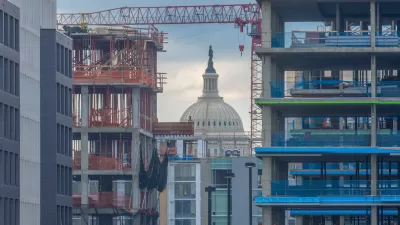The audit points to inefficiencies in the state's process for identifying and using surplus properties to create affordable housing.

An article from the San Francisco Chronicle highlights the results of a state audit that accuses California of failing to effectively use surplus state-owned properties to increase affordable housing. "Michael Tilden, the acting state auditor, reviewed California's compliance with a 2019 executive order by Gov. Gavin Newsom that prioritizes the use of state-owned land to support the creation of affordable housing."
"While it's estimated more than 30,000 units of affordable housing could be provided to renters under the executive order, the state Department of General Services needs to speed up the process of offering properties for development, the audit concluded."
The report recommends new laws that require agencies to comply with the executive order, regular comprehensive reviews to assess additional properties, and better communication between agencies. "Of the 92 properties the department plans to develop, it has made only 19 available, the report found. In addition, the department anticipates that it will take seven years to make the remaining parcels available, 'but the addition of just one staff member could reduce that time by more than two years,' Tilden wrote."
According to the article, "The Department of General Services (DGS) and the Department of Housing and Community Development (HCD) generally agreed with the report’s assessments and noted that they would implement the recommendations, the auditor’s office said."
FULL STORY: Audit: California too slow in offering affordable housing

Maui's Vacation Rental Debate Turns Ugly
Verbal attacks, misinformation campaigns and fistfights plague a high-stakes debate to convert thousands of vacation rentals into long-term housing.

Planetizen Federal Action Tracker
A weekly monitor of how Trump’s orders and actions are impacting planners and planning in America.

In Urban Planning, AI Prompting Could be the New Design Thinking
Creativity has long been key to great urban design. What if we see AI as our new creative partner?

Massachusetts Budget Helps Close MBTA Budget Gap
The budget signed by Gov. Maura Healey includes $470 million in MBTA funding for the next fiscal year.

Milwaukee Launches Vision Zero Plan
Seven years after the city signed its Complete Streets Policy, the city is doubling down on its efforts to eliminate traffic deaths.

Portland Raises Parking Fees to Pay for Street Maintenance
The city is struggling to bridge a massive budget gap at the Bureau of Transportation, which largely depleted its reserves during the Civd-19 pandemic.
Urban Design for Planners 1: Software Tools
This six-course series explores essential urban design concepts using open source software and equips planners with the tools they need to participate fully in the urban design process.
Planning for Universal Design
Learn the tools for implementing Universal Design in planning regulations.
Gallatin County Department of Planning & Community Development
Heyer Gruel & Associates PA
JM Goldson LLC
City of Camden Redevelopment Agency
City of Astoria
Transportation Research & Education Center (TREC) at Portland State University
Jefferson Parish Government
Camden Redevelopment Agency
City of Claremont





























